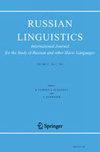词法上相关的同义词是如何构成范式的
IF 0.8
3区 文学
0 LANGUAGE & LINGUISTICS
引用次数: 1
摘要
本文章由计算机程序翻译,如有差异,请以英文原文为准。
How morphologically related synonyms come to make up a paradigm
求助全文
通过发布文献求助,成功后即可免费获取论文全文。
去求助
来源期刊

RUSSIAN LINGUISTICS
LANGUAGE & LINGUISTICS-
CiteScore
1.20
自引率
0.00%
发文量
21
期刊介绍:
Russian Linguistics is a peer-reviewed journal devoted to the empirical and theoretical study of Russian and other Slavic languages in all their diversity. It is open to all areas of linguistics, welcoming empirical, theoretical and applied approaches as well as in-depth qualitative and larger-scale quantitative studies from both synchronic and diachronic perspectives.
Russian Linguistics publishes three types of articles: 1) original articles as full reports of data from own research, 2) reviews of recent research (not older than 2 years), 3) squibs as shorter contributions initiating discussions relevant within their field and to the specific question they address.
The journal invites submissions written in English or Russian. It is recommended to write in English in order to facilitate a wider outreach in the linguistic community.
 求助内容:
求助内容: 应助结果提醒方式:
应助结果提醒方式:


